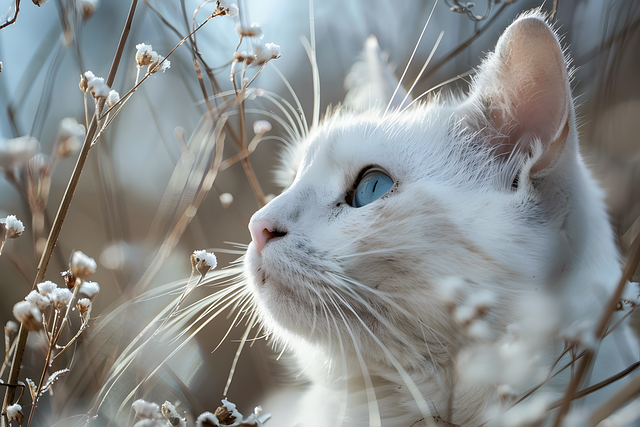6 Shocking Reasons Why Your Cat Stops Eating – Act Now!
As a member of a feline family, your cat’s eating pattern can tell you about its feelings and health. An abrupt change in meal time activity, such as not eating, can be stressful and frightening for pet owners. Some of the common causes are a change in environment, food choice, or a critical one such as an underlying sickness.
While some cats are just finicky, a refusal to eat could mean they are ill. Unlike humans, animals cannot rely on fat reserves for long. Their energy supplies must be adequate, or they risk rapid weight loss. If food intake stops for too many days, they may exhaust their stored fuel, leading to a dangerous condition called hepatic lipidosis, which can lead to liver failure. I’ll explain it deeply as you read title 6 Shocking Reasons Why Your Cat Stops Eating – Act Now!
It’s significant to monitor for any alteration of appetite and do something about it promptly. When your cat stops being interested in food overnight, don’t be flip about it—this’s an issue which requires medical evaluation. A sooner response can serve to identify the cause and nip the issue before it gets bad.
A veterinarian can provide recommendations and ensure your pet gets the protein and nutrients it needs. I’ve seen cats that normally eat well suddenly stop, and it’s often a sign that something is wrong. By staying attentive, you’ll be better able to help your cat before the situation becomes overwhelming.

Why Is My Cat Not Eating?
When cats refuse to eat for a day or two, it can be more than just being picky—it might indicate an underlying issue. The causes can range from minor digestive discomfort to a serious health condition. If your cat’s loss of appetite is evident and persistent, a veterinarian visit is necessary to find the root of the problem.
In some cases, a physical exam alone may not be enough and could require further diagnostic tests, including blood work, X-rays, or an ultrasound. These steps help rule out poor organ function, infections, or other medical emergencies that can have serious consequences.
Without adequate nutrition, dangerous issues can occur, such as muscle breakdown and weakened immunity. I once cared for a cat that seemed fine but had gradually stopped eating—only through thorough testing did we discover an internal issue that required immediate treatment. Identifying possible reasons early ensures a better chance of recovery and keeps your cat healthy.
1. Feline respiratory infection
When cats have a stuffy nose from an infection, they struggle to smell their food, which can make them stop eating. This happens with both viral and bacterial infections. If your cat has sneezing, a runny nose, or watery eyes, call your vet. Viral infections usually resolve by themselves, but bacterial infections can require antibiotics or other medication.
To encourage your cat to eat, try feeding them wet food with a pungent odor. Warming up canned food also helps make it more enticing. If they still don’t eat, it may not be a cold—issues such as nasal polyps, tumors, or dental issues might be the cause.
Sometimes, life-threatening diseases such as kidney disease, pancreatitis, or even cancer might be responsible. If your cat just loses appetite, pay attention to other signs and get them investigated immediately.
2. Dental Issues
Cats will completely refuse to eat if they contract mouth diseases that are painful and uncomfortable. Conditions such as tartar, gingivitis, and inflammation of the tissues can make chewing excruciating. In extreme situations, cancerous growths in the mouth may also hinder their eating.
Warning signs to look out for are bad breath, drooling, bleeding, and swelling on the face. These are prevalent issues, as 50% to 90% of cats aged more than 4 years suffer from some type of dental disease.
As it becomes more difficult for them to eat, cats will become withdrawn or aggressive and can begin swallowing large chunks of food or dropping them. Weight loss, sneezing, and a runny nose are other signs that show infection spreading. If you observe these symptoms, a visit to the vet is important to make them comfortable again and get them eating.

3. Food avoidance in cats
Occasionally, cats acquire food aversion, particularly following an illness or hospitalization. If they connect a specific food with sickness, they will not eat even after they have recovered. Hospitalization stress can also make them refuse to eat, and this may take creativity, trial and error, to find out what they will eat again.
In emergency care or recovery, a veterinarian can suggest a high-density calorie diet so that the cat receives the necessary nutrients in small quantities. Such diets prevent weight loss and aid in healing. Encouraging the cat to eat may require patience, but getting the right method is important for their health.
4. Stress-induced anorexia in cats
The feelings of cats greatly influence their diet, and depression, anxiety, or stress will cause them to lose their appetite. They may refuse to eat after the death of a human family member or another pet in the household.
Even small shifts in their internal environment can trouble them a lot. Renovations within the house or outdoors, introducing new furniture, or even rearranging the facilities of food, water, and toilets can discomfort them.
Social conflict with other pets in the home and exposure to strange odors and smells can also lead to loss of appetite. Some cats have difficulty coping with change, and efforts to minimize stress—such as keeping routine familiar and providing quiet areas—can make them feel safe and resume normal eating.
5. Digestive disorders and anorexia in cats
Some other gastrointestinal problems in cats may result in a suppressed appetite, including foreign body obstruction from swallowing something it should not, cancer, pancreatitis, inflammatory bowel disease, or constipation.
Diseases such as diabetes and kidney disease may also result in nausea and cause the cat to turn away food. If your cat is vomiting or experiencing changes in thirst or urination, these may be signs of an underlying health problem.
Some drugs, including chemotherapy or antibiotics, can nauseate a cat and have it drooling, excessively licking its lips, or displaying minimal appetite. Some might attempt to eat but spit out food rather than swallowing. If your cat is skipping meals or not eating comfortably, a visit to the vet is essential to diagnose the underlying issue.
6. Psychological factors affecting feline eating habits
A veterinarian can determine if a cat is physically sick or if anxiety and depression are the reason they refuse to eat. Changes in routine or the household, such as new people, pets, or the disappearance of a familiar presence, can be disturbing to sensitive cats and affect their emotional well-being. Even a finicky eater might stop eating due to stress.
Cats are slow to adapt to various foods, so a recent diet change might be the reason. Other conditions that can upset them are too much noise, other pets in the vicinity of their feeding station, or even dirty plates. If their plate is too close to the litter box, they will not eat. Maintaining their surroundings calm and consistent will make them feel safe and hungry again.

What to Do If a Cat Won’t Eat?
Cats are very good at concealing pain and discomfort as a species, so it is worth noting behavior regarding eating. Failure to eat can be a sign of a health problem, and the appropriate treatment will be based on the reason.
A veterinarian decides if the cat requires antibiotics, surgery, a change in diet, hospitalization, fluids, or medication to alleviate nausea and encourage appetite. If the cat is otherwise in good health but finicky, minor changes can make a difference.
Tips for feeding include providing foods with varied textures, flavors, and shapes. Warming up wet food makes it smell more, which is more appetizing. If refrigerated, leaving it at room temperature may make it more desirable.
Dry food exposed for more than a month will be stale or even rancid, so freshness should always be checked. Small volumes of water or low-sodium chicken broth added can enhance palatability and stimulate eating. Tinkering with these steps may revive eating in your cat.
When to Seek Immediate Veterinary Care for Appetite Loss

If your cat hasn’t eaten in two days, or if a kitten or overweight cat refuses food, call a vet right away. Cats that stop eating are at risk of hepatic lipidosis, a dangerous liver disease that happens when their body doesn’t get enough fat or calories.This condition is dangerous and requires immediate treatment.
Loss of appetite is more critical if it is accompanied by vomiting, diarrhea, lethargy, difficulty breathing, or yellowing of the skin and eyes. Don’t delay—early intervention can save your cat’s life. Even if they appear to be okay, monitor for warning signs and act quickly if something is not right.
You can also read out my this post: 5 Best Cat Breeds for First-Time Owners – Stress-Free Choices!

